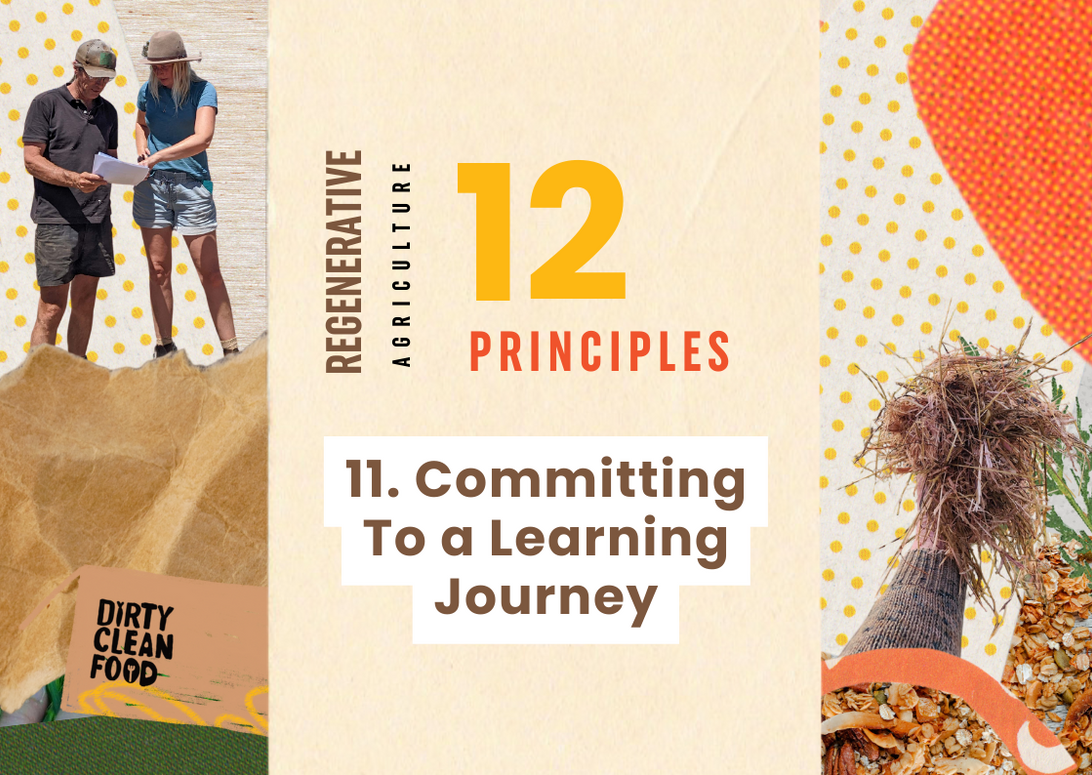
Regen Ag #11 - Committing to a Learning Journey
|
Time to read 3 min
|
Time to read 3 min
Welcome to our 12 Principles of Regenerative Agriculture series- where we define "regen ag" and show you how regenerative farming changes the planet, the system, and our food.
Agriculture has historically been shaped by tradition and conventional wisdom, to optimise outputs and increase profits. Regeneratively farming, to all of us at the end point, seems like the way it should always be, but clearly this isn't the case and thinking regeneratively represents a paradigm shift in how things have been done for hundreds of years. We're on a journey to return to observing nature as it is, and finding the best systems to work with nature in an industry that has developed far beyond taking this into consideration.
It may seem obvious that a core principle we want to highlight in regenerative agriculture is, "committing to a learning journey". We want to acknowledge continuous learning and adaptation to the forces of change against what already exists. To do this takes a lot of observation, trials and sacrifice for a better future for healthy food, our families and the planet.
Regenerative agriculture is not a rulebook of techniques; it is a holistic approach to farming that seeks to restore ecosystems, enhance biodiversity, and improve soil health while simultaneously providing for sustainable food production.
At its heart lies a deep understanding of the interconnectedness of all elements within an agricultural system. However, this understanding is not static; it evolves through ongoing observation, experimentation, and learning. Advocating for change matters as consumers hold the buying power that leads industry change.
Committing to a learning journey in regenerative agriculture is about adopting a mindset of humility and curiosity. It requires farmers to recognize that they are part of a larger ecological tapestry and that their actions have far-reaching consequences. By embracing this mindset, farmers become active participants in the dynamic process of ecological regeneration.
Central to the concept of committing to a learning journey is the recognition that there is no one-size-fits-all solution in regenerative agriculture. Each farm is unique, shaped by its particular ecological context, climate, and topography. What works on one farm may not work on another, and what works today may need to be adapted tomorrow. Therefore, farmers must be willing to experiment, to try new approaches, and to learn from both successes and failures.
This commitment to learning is not always easy. It requires farmers to step outside of their comfort zones, to question conventional wisdom, and to challenge the status quo. It may involve taking risks, investing time and resources into new practices, and being willing to accept temporary setbacks. However, the rewards can be significant: improved soil health, increased yields, enhanced resilience to climate change, and a deeper connection to the land.
One of the key aspects of committing to a learning journey is the importance of observation. By closely observing the natural rhythms and patterns of their land, farmers can gain valuable insights into how their actions impact the ecosystem. This intimate knowledge allows them to make more informed decisions and to fine-tune their management practices accordingly.
Furthermore, committing to a learning journey fosters a culture of collaboration and knowledge sharing within the regenerative agriculture community. Farmers, researchers, and practitioners come together to exchange ideas, share experiences, and co-create new solutions. This collective wisdom accelerates the pace of innovation and enables farmers to learn from the successes and failures of others.
In conclusion, committing to a learning journey is not just a principle of regenerative agriculture; it is the lifeblood that sustains it. By embracing a mindset of humility, curiosity, and experimentation, farmers can unlock the transformative potential of regenerative agriculture and become stewards of thriving, resilient ecosystems. As we face the challenges of climate change, soil degradation, and food insecurity, the imperative to commit to a learning journey has never been greater. Together, we can embark on this journey of regeneration and cultivate a more sustainable future for generations to come.
‘Regenerative agriculture is an ecological approach to farming that allows landscapes to renew themselves.’




